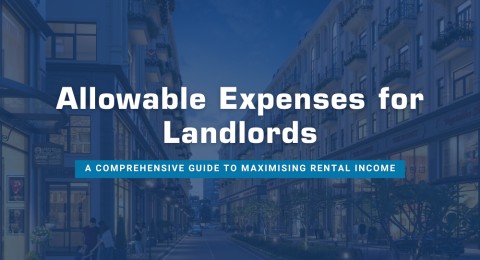
Let’s talk about a topic that might not be the most glamorous but is essential for any landlord—allowable expenses for landlords. Whether you're managing properties on your own or through letting agents, knowing which expenses can be deducted is key to maximising rental income and optimising tax relief. For landlords, property management can be a balancing act, especially when juggling tenant needs, house valuation, and rental demand in areas like Rent Stockport. But understanding these deductible expenses can make all the difference in your bottom line. So, let’s dive into what you can claim to lower your tax bill while keeping your properties in top condition.
What Are Allowable Expenses for Landlords?
Allowable expenses are costs that landlords can deduct from their rental income, reducing the amount of tax owed. These are essential expenses required to keep the property running efficiently. Understanding what qualifies as an allowable expense can save you a significant amount of money during tax time, especially in competitive rental markets like Rent Stockport.
Learn more about how landlords can benefit from various tax reliefs available to them.
- Repairs and Maintenance: Essential for Property Management Success
Managing repairs and maintenance is a core part of good property management. If you're working with letting agents or handling things independently, staying on top of these tasks is critical for maintaining the property's value and keeping tenants happy.
Routine repairs such as fixing a leaky roof or cracked windows are deductible expenses. Keeping your property in good shape not only helps with house valuation but also ensures a comfortable living environment for tenants. Regular maintenance contracts, like boiler checks or annual inspections, are essential and deductible as well. - Utility Bills: Reducing Costs While Keeping Your Property Running
If you're covering the utility bills—gas, water, or electricity—these are deductible, provided you’re responsible for paying them. If tenants cover these costs, however, they aren’t considered allowable expenses. - Council Tax and Service Charges: Managing Obligations Efficiently
If you're footing the bill for council tax or service charges for your rental property, these are deductible too. Council tax is deductible if you’re paying it on behalf of your tenants, and service charges, which cover communal area maintenance, can also be claimed.
For more details on your responsibilities as a landlord, visit the UK Government’s official guidelines on property allowance. - Insurance Costs: Protecting Your Investment
Insurance is crucial, not just for protecting your property but also for getting tax relief. Buildings insurance, contents insurance (for furnished properties), and landlord liability insurance are all deductible expenses. - Letting Agents and Tenant Management: Deductions That Make a Difference
If you hire letting agents to manage your property, their fees are deductible, as are the costs associated with finding and vetting tenants. This is particularly beneficial in areas like Rent Stockport, where frequent tenant turnover may lead to higher management costs.
For more tips on managing your properties efficiently, check out My Tax Accountant’s guide on claiming against tax for landlords. - Interest on Loans: Cutting Down Borrowing Costs
Interest on loans taken out to buy or improve rental property is deductible. For buy-to-let mortgages, you can deduct the interest portion, although the full mortgage payment itself is not deductible. This deduction can make a significant difference, especially in markets where property improvements and mortgage management directly impact house valuation.
What’s Not Allowable? A Few Things to Watch Out For
It’s important to remember that personal expenses, such as holidays or personal phone bills, aren’t deductible. Similarly, capital expenditures, such as adding an extension or renovating a kitchen, are considered improvements and not deductible. These expenses are factored into the property's value and can reduce capital gains tax when you sell the property.
- Apportioning Costs: Managing Mixed-Use Properties
If a property is used partly for personal purposes and partly for rental, only the portion related to rental use is deductible. Apportioning costs ensures you're only claiming what’s allowable for your rental business. - Keeping Records: The Key to Avoiding Lost Deductions
Keeping accurate records—receipts, invoices, and contracts—is vital to ensure you don’tmiss out on deductions. Use accounting software or a simple spreadsheet to track your expenses and streamline the process during tax season. - House Valuation and Loan Interest: Managing Financial Considerations
Maintaining your property’s condition through repairs and professional property management services helps retain or even improve its value. This is especially important in areas like Rent Stockport, where house valuation can influence future rental income. - Staying Updated: Changes and Updates for Letting Agents and Property Management
Tax laws are always evolving, so staying updated on the latest rules around allowable expenses and deductions is crucial. In competitive rental markets like Rent Stockport, keeping up with these changes ensures your business remains compliant while maximising savings. - Tenant Management and Legal Expenses: Don’t Overlook These Deductions
Tenant management expenses, including legal fees for disputes or tenancy agreements, are deductible. Efficient tenant management, especially in areas with high turnover, can make a big difference in rental operations and long-term profitability.
Conclusion
Navigating the world of allowable expenses for landlords may not be thrilling, but it’s essential for maximising your rental income and optimising tax relief. By staying organised, keeping up with tax law changes, and understanding the difference between routine maintenance and capital improvements, you can make the most of your rental investments. Whether you manage properties on your own or through letting agents, staying informed about what you can deduct will make a world of difference in your bottom line.
Happy landlording!

